Classic Commentaries and Studies on Colossians and Philemon (14 vols.)
Digital Logos Edition
Overview
The Classic Commentaries and Studies on Colossians and Philemon (14 vols.) includes some of the most significant classic studies on Colossians and Paul’s letter to Philemon from the late nineteenth and early twentieth centuries. With notable authors such as H. G. C. Moule, the Classic Commentaries and Studies on Colossians and Philemon (14 vols.) offers over 4,000 pages of exegetical analysis, rhetorical context, contextual comparison, and interpretation. The forteen volumes contained in Classic Commentaries and Studies on Colossians and Philemon (14 vols.) have had an enduring impact on New Testament exegesis, and this exceptional collection provides easy accessibility to this wealth of significant scholarship.
This collection is essential for students, scholars, pastors, historians, teachers of the Bible, or anyone studying Colossians and Philemon. With Logos Bible Software, this collection is completely searchable, with passages of Scripture appearing on mouse-over, as well as being linked to the Greek and Latin texts and English translations in your library. This makes these texts more powerful and easier to access than ever before for scholarly work or personal Bible study. With the advanced search features of Logos Bible Software, you can perform powerful searches by topic or Scripture reference—finding, for example, every mention of “Jesus,” or “Colossians 1:15.”

- Over four-thousand pages of commentary on Colossians and Philemon
- A variety of scholars from differing traditions and backgrounds
- Completely searchable and linked to your preferred Bible translation and other books in your library
- Title: Classic Commentaries and Studies on Colossians and Philemon
- Volumes: 14
- Pages: 4,633
- Expository Lectures on St. Paul's Epistle to the Colossians by Daniel Wilson
- An Exposition of the Epistle of St. Paul to the Colossians, vol. 1 by John Davenant
- An Exposition of the Epistle of St. Paul to the Colossians, vol. 2 by John Davenant
- Sunday Mornings with My Flock: On St. Paul's Letter to the Colossians by James Spence
- The Epistle of Paul to the Colossians by S. R. Macphail
- Commentary on the Epistle to the Colossians by Edwin C. Dargan
- An Exposition of the Epistle of Saint Paul to the Colossians by Jean Daille
- The Epistle of Paul to the Colossians: Analysis and Examination Notes by G. W. Garrod
- Christ and the Inheritance of the Saints: Illustrated in a Series of Discourses from the Colossians by Thomas Guthrie
- An Exposition upon the Epistle to the Colossians: Being the Substance of Near Seven Years' Week-Day Sermons by Nicholas Byfield
- The Epistle of St. Paul to Philemon: A Devotional Commentary by A. H. Drysdale
- A Discourse on St. Paul's Epistle to Philemon by N. S. Wheaton
- Notes on the Greek Text of the Epistle Paul to Philemon by Horatio B. Hackett
- Colossian and Philemon Studies: Lessons in Faith and Holiness by H. G. C. Moule
This title is included in the following collections
You can save when you purchase this product as part of a collection.
Logos 8 Collector's Edition Le...
$11,399.99$11,399.99Logos 9 Collector's Edition Le...
$11,399.99$11,399.99Logos 8 Ultimate Legacy Librar...
$21,749.99$21,749.99Logos 9 Ultimate Legacy Librar...
$24,999.99$24,999.99
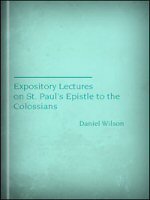
Expository Lectures on St. Paul's Epistle to the Colossians
- Author: Daniel Wilson
- Publisher: J. Hatchard and Son
- Publication Date: 1859
- Pages: 395
Originally lectures given to his parish at the Parochial Chapel in London in 1815, and later condensed to serve as lecture for Lent, Wilson's Expository Lectures on St. Paul's Epistle to the Colossians consists of thirty-five lectures that form a complete commentary on Colossians. Wilson moves from verse to verse, offering insight and exegetical notes on key parts of Colossians.
Daniel Wilson was educated St. Edmund Hall, Oxford (BA, MA, DD). He was tutor and vice-principal of St. Edmund Hall from 1807–1812. Towards the end of his life he was consecrated bishop of Calcutta.
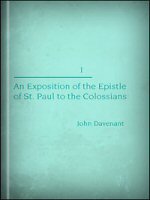
Translated from Latin by Josiah Allport, John Davenant's An Exposition of the Epistle of St. Paul to the Colossians, vol.1 expounds on the first two chapters of Paul's letter to the Colossians. Originally delivered in Cambridge at his commencement to the post of Theology Professor, Davenant provides exegetical and homiletical notes on each section of Colossians. Also included with the commentary proper is a brief biographical sketch of the life of Davenant as well as a section on the diversity of degrees of ministers within the church.
James Davenant (1572–1641) was a Professor and Bishop in the Church of England. Educated at Queens College, Cambridge, Davenant became bishop of Salisbury in 1621. He also served as the Lady Margaret's Professor of Divinity. In 1618 Davenant was chosen by King James I to represent the Church of England at the Synod of Dort.
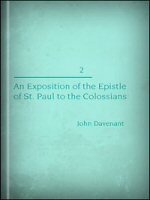
Translated from Latin by Josiah Allport, John Davenant's An Exposition of the Epistle of St. Paul to the Colossians, vol. 2 completes his exposition on Paul's letter to the Colossians. Originally delivered in Cambridge at his commencement to the post of Theology Professor, Davenant provides exegetical and homeletical notes on each section of Colossians. Also included with the commentary proper is a brief biographical sketch of the life of Davenant, a section on the diversity of degrees of ministers within the church, and a dissertation “On the Extent of the Death of Christ.”
James Davenant (1572–1641) was a Professor and Bishop in the Church of England. Educated at Queens College, Cambridge, Davenant became bishop of Salisbury in 1621. He also served as the Lady Margaret's Professor of Divinity. In 1618 Davenant was chosen by King James I to represent the Church of England at the Synod of Dort.
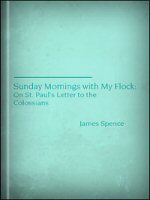
James Spence spent nearly twenty-five years teaching and preaching on Paul's letter to the Colossians. The fruit of this study, Sunday Mornings with My Flock: On St. Paul's Letter to the Colossians is a detailed exegesis of the text of Colossians. While exegetical in nature, Spence's commentary is also very practical in character, having always in mind the church.
James Spence was Professor at the University of Aberdeen, Scotland.
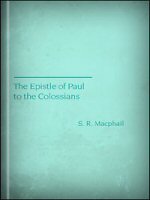
Macphail's The Epistle of Paul to the Colossians is an attempt "to reproduce the thought of the letter in the verbal expression employed by the Apostle." By using two key Pauline terms in Colossians, pleroma (fullness) and musterion (secret), Macphail traces Paul's argument through his letter to the Colossians.
Rev. S. R. Macphail was Professor at the University of Liverpool, England.
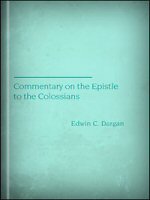
Although brief, Edwin Dargan's Commentary on the Epistle to the Colossians is an exposition through Colossians in a verse-by-verse manner. Exegetically sound and pastoral in character, Dagan guides the reader through Colossians.
Rev. Edwin C. Dargan was Pastor of Citadel Baptist Church in Charleston, South Carolina.
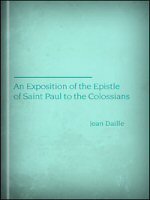
Jean Daille's An Exposition of the Epistle of Saint Paul to the Colossians consists of sermons that were first preached to his congregation in Charenton, France. Expositional in nature, Daille guides the reader through the letter of Paul to the Colossians verse-by- verse.
Rev. Jean Daille was Minister of the French Reformed Church at Charenton, France.
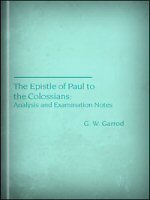
G. W. Garrod's The Epistle to the Colossians: Analysis and Examination Notes is an verse-by-verse exposition of Paul's letter to the Colossians. In this commentary, Garrod analyzes Colossians, offering explanatory notes on key words, phrases, and topics. Also included is a chapter on the comparisons between Colossians and Ephesians.
Rev. G. W. Garrod was Principal of the Ripon and Wakefield Diocesan Training College.
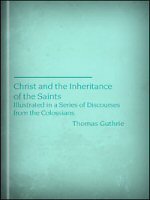
Organized in a series of discourses on specific topics in Colossians, Christ and the Inheritance of the Saints: Illustrated in a Series of Discourses from the Colossians proceeds through Colossians section by section. Each of Guthrie's twenty discourses highlights a theme from Colossians and expand on it in great detail.
Thomas Guthrie is also the author of Pleas for Ragged Schools.
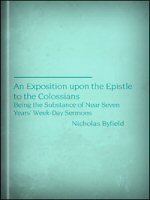
In An Exposition upon the Epistle to the Colossians: Being the Substance of Near Seven Years' Week-Day Sermons, Nicholas Byfield structures his commentary on Colossians according to the following outline, A proem (introduction), doctrine of faith, precepts of life, and an epilogue or conclusion. Byfields commentary is an exposition of Paul's letter to the Colossians, moving through Paul's argument a section at a time.
Nicholas Byfield was one of the preachers for the city of Chester in England. He is also the author of such works as Assurance of God's Love and Man's Salvation, Directions for Private Reading of Scriptures, How a Godly Christian may Support his Heart with Comfort, and Beginning of Doctrine of Christ.
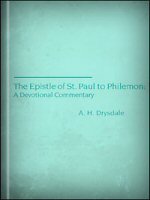
A. H. Drysdale's The Epistle of St. Paul to Philemon: A Devotional Commentary offers the reader a devotional commentary on Paul's letter to Philemon. Consisting of two hundred pages of expository and devotional comments, Drysdale's commentary is a helpful and practical guide through Paul's letter to Philemon.
Alexander Hutton Drysdale was a Presbyterian minister in England.
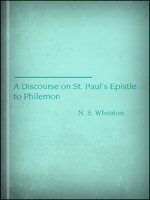
Originally preached as a sermon against slavery in the northern states on December 22, 1850, N. S. Wheaton's A Discourse on St. Paul's Epistle to Philemon is a brief discourse on Paul's letter to Philemon. N. S. Wheaton uses the text of Philemon as an example for his listeners to abide by. Practical in nature, Wheaton's discourse on Philemon is a useful example of how Scripture is applied to every generation.
N. S. Wheaton was a minister in the Episcopal Church.
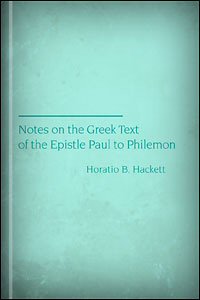
Although brief, Horatio B. Hackett's Notes on the Greek Text of the Epistle Paul to Philemon is very useful for an exegetical study of Paul's letter to Philemon. Analyzing the Greek text of Philemon, Hackett moves through Philemon verse-by-verse. Hackett interacts with other commentators of his day in his study of key words, phrases, and other important elements of the Greek text of Philemon.
Horatio B. Hackett was professor of Hebrew, Greek and Latin. He was educated at Amherst College and Andover Theological Seminary. He taught at Mount Hope College, Brown, Newton Theological Institution, and Rochester Theological Institution. He authored Illustrations of Scripture and contributed thirty articles to William Smith’s Dictionary of the Bible.
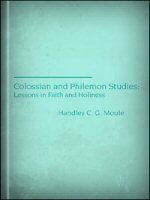
Known for his other commentaries on the the Pauline Epistles, Moule's Colossian and Philemon Studies: Lessons in Faith and Holiness is an exegetical, practical and pastoral commentary on Paul's letters to the Colossians and Philemon. Moule offers his comments on the English text of these Pauline letters, but also interacts with the Greek text at points when needed to further highlight important aspects from the text of Colossians and Philemon.
H. C. G. Moule was the son of the vicar of Fordington, Dorchester, and was educated at home prior to attending university at Cambridge. He was ordained in 1867 and was curate at Fordington before being appointed as dean of Trinity College, Cambridge, 1873 to 1876. During his tenure at Cambridge he became first principal of Ridley Hall Theological College, in 1881, and Norrisian Professor of Divinity in 1899. In 1901, he succeeded B.F. Westcott as Bishop of Durham.
Noted for the many hymns and poems he penned, Bishop Moule’s works also include expositions and commentaries on nearly all the Epistles, as well as books on devotion. He is the author of the popular The Epistle to the Romans and Outlines of Christian Doctrine (a down-to-earth work on theology). Moule also contributed to The Fundamentals (4 volumes), Cambridge Greek Testament for Schools and Colleges, and The Cambridge Bible for Schools and Colleges.
Reviews
5 ratings

M. David Johnson
3/27/2015

Larry Proffitt (I
11/13/2013

Caleb Allen
10/12/2013

Bill Shewmaker
10/8/2013
Eduardo Vega
9/25/2013